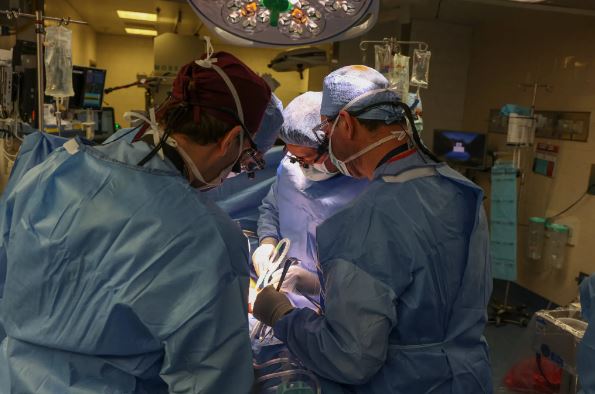In a groundbreaking medical achievement, surgeons in Boston successfully transplanted a kidney from a genetically engineered pig into a 62-year-old man, marking the first procedure of its kind. This milestone offers hope to hundreds of thousands of Americans grappling with kidney failure.
The surgery, conducted at Massachusetts General Hospital (Mass General), has shown promising signs of success. Following the procedure last weekend, the newly transplanted kidney began producing urine shortly thereafter, and the patient’s condition has been steadily improving. Physicians at Mass General have reported that the patient, a Black man, is already up and walking around the hospital corridors and may soon be discharged.
Dr. Winfred Williams, associate chief of the nephrology division at Mass General, highlighted the potential significance of this achievement for Black patients, who disproportionately suffer from end-stage kidney disease. He emphasized that access to kidneys from genetically modified animals could address the longstanding disparity in transplant availability among minority patients.
Dr. Leonardo V. Riella, medical director for kidney transplantation at Mass General, expressed optimism that if xenotransplantation becomes widespread, dialysis—a procedure that filters toxins from the blood—could become obsolete, revolutionizing the treatment landscape for kidney failure.
Currently, over 800,000 Americans rely on dialysis due to kidney failure, with more than 100,000 individuals awaiting kidney transplants. Moreover, end-stage kidney disease is three times more prevalent among Black Americans compared to white individuals. With chronic kidney disease affecting tens of millions of Americans, the demand for viable treatment options is urgent.
Xenotransplantation, the transplantation of animal organs into humans, has long been proposed as a solution to the organ shortage crisis. Recent advancements in gene editing and cloning have brought this possibility closer to reality, enabling scientists to modify animal genes for improved compatibility and reduced risk of rejection by the human immune system.
In this case, the kidney was sourced from a pig engineered by the biotech company eGenesis, which removed three genes associated with organ rejection and inserted seven human genes to enhance compatibility. Additionally, precautions were taken to deactivate retroviruses carried by pigs that could potentially infect humans.
While this achievement marks a significant leap forward in medical science, it has not been without controversy. Critics, such as Kathy Guillermo from People for the Ethical Treatment of Animals (PETA), have raised concerns about the ethical implications of exploiting animals for organ transplantation and the potential risk of introducing new pathogens into human populations.
The four-hour surgery, performed under a Food and Drug Administration compassionate use provision, was led by a team of surgeons at Mass General, including Dr. Tatsuo Kawai and Dr. Nahel Elias. The patient, Richard “Rick” Slayman, a state transportation department supervisor, had faced significant health challenges due to diabetes and hypertension. After years of dialysis and a failed human kidney transplant, he faced a prolonged wait for another human kidney before opting for the groundbreaking pig kidney transplant.
Mr. Slayman’s decision to undergo this experimental procedure reflects not only his personal resilience but also his commitment to providing hope for countless others in need of organ transplants. As he continues his recovery, doctors will closely monitor him for signs of organ rejection while celebrating the remarkable progress made possible by this pioneering medical advancement.

